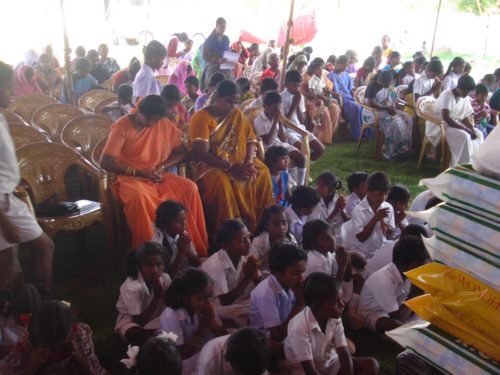What I remember most was the heat. I remarked that it was like an entity and seemed to have it’s own pestilential personality. I could never get my hair dry and took to carrying a kind of towel and wearing it around my neck. We were in India and somehow someone back in the States saw a picture and criticized us for not wearing black clerical shirts. I remember my reaction being unprintable and probably uncharitable. The rest of my party went to the black shirts and I went to a T shirt and a photographers vest. Those are some of my memories, and as friends of mine have told me, memory can be a problem. It can be deceptive and capricious. And yet there are things that we remember.
We were in India visiting sites that had had been badly hit by a tsunami. There were centers for teaching people how to sew and schools that had lost everything that received computers and resettlement places for families that had lost everything as well. I use the phrase “narrow places” because in times of stress and tribulation we feel confined and locked down. Luther talks about sin constricting us and grace releasing us to open spaces. Christ Jesus lay in death’s strong bands constricted by our sins and God’s Judgement and He broke through. His victory is the ultimate freedom for us. We get the chances to be the hands of feet of Christ who broke free so that we can be free and have abundant life. What I saw in India were examples of the hands and feet of Christ empowered by the generosity of folks from Minnesota and North Dakota who might never get a change to meet the folks they are trying to help.
My memory is of thankfulness for the partnership that we share and have shared for years. In 1894, The Lutheran Church—Missouri Synod (LCMS) established the Missouri Evangelical Lutheran India Mission (MELIM) organization to send missionaries to India. A year later, the LCMS called former Leipzig Mission missionaries, Rev. Theodore Naether and Rev. Thomas Mohn to serve near the city of Ambur. They became the first LCMS missionaries to serve in a foreign mission field. The Indians have memories as well of these first two missionaries who are remembered and revered. Naether in particular, is remembered for contacting the plague and building his own coffin and playing the violin as he died.
I remember the heat and the colors. Coming around a crowded corner (there is no other kind of corner in India) and getting a visual brain freeze at the sight of spices in colors and vibrancy that is hard to explain. There are colors that may not have been named yet. Of course the smell was incredible as well.
I remember the children and the gracious hosts that fed us and gave us wonderful gifts of cloth and brightly colored babbles that we got to wear during the ceremonies and speeches and prayers. Marvelous people who had gone through very tough times thankful for our presence and our work together to spread the Gospel sharing their trust in Christ with us is a great memory.




Thank you, Pastor! I am grateful to you, Pastor Fale and Mr. Storkson for spending time with us and going around every nook and corner of the LCMS Mercy Projects in India! God’s blessings!!